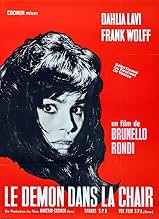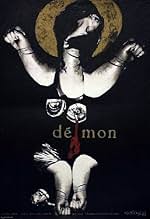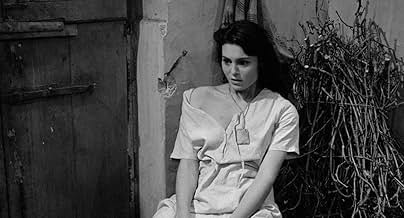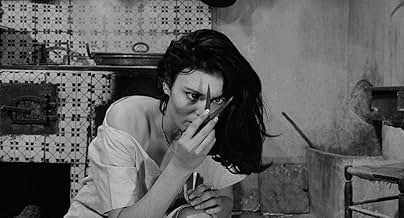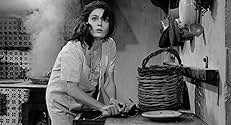AVALIAÇÃO DA IMDb
7,2/10
1,5 mil
SUA AVALIAÇÃO
Adicionar um enredo no seu idiomaA lonely, sexually-uninhibited young peasant is subjected to an exorcism after she hexes a man who rejects her advances.A lonely, sexually-uninhibited young peasant is subjected to an exorcism after she hexes a man who rejects her advances.A lonely, sexually-uninhibited young peasant is subjected to an exorcism after she hexes a man who rejects her advances.
- Direção
- Roteiristas
- Artistas
- Prêmios
- 1 vitória e 1 indicação no total
Anna María Aveta
- Sister Angela
- (as Anna Maria Aveta)
María Teresa Orsini
- Nun
- (as Maria Teresa Orsini)
Luciana Angiolillo
- La Signora di Craco
- (não creditado)
Andrea Bosic
- Priest
- (não creditado)
Nino Castelnuovo
- Buca
- (não creditado)
Giovanni Cristofanelli
- Padre Tommaso
- (não creditado)
Laura Nucci
- La Madre di Purif
- (não creditado)
Nicola Tagliacozzo
- Zio Giuseppe
- (não creditado)
Avaliações em destaque
Brunello Rondi's remarkable drama takes a very naturalistic approach to its tale of Witchcraft and Possession in Southern Italy. An attractive young woman, Puri (Daliah Lavi) seems to be in the throes of Amour Fou with a young man, Antonio (Frank Wolff). When he tells her he's getting married, Puri's rage turns into casting an evil spell on Antonio, his marriage and future offspring. Puri's rantings give way to bouts of apparent possession, speaking in tongues and contortions of her body*. She is condemned as a witch and presented to the local priest for exorcism.
Rondi, a long-time screenwriting collaborator with Federico Fellini (including two Oscar nominations) fashions his film as a folk horror tale in the vein of a WICKER MAN, KWAIDAN or THE WITCH. What is real and what isn't is far less important than an exploration of an unfortunate soul and the locals who cast her out. Rondi's script is replete with specific local Italian traditions and rituals which provide added layers into his examination of the intersection of superstition and religion and how they seemingly over-ride any compassion for the woman's mental health and stability. Cinematographer Carlo Bellero's stunning Black & White camerawork pits Puri against the forboding barren landscape capturing her feeling of isolation from her people and home. Piero Piccioni's score is quite good. None of this would truly work without a superb performance by Lavi (who is best known in the U. S. for the original CASINO ROYALE and TWO WEEKS IN ANOTHER TOWN). She brings an earthy intensity and her background in dance allowed her to perform her seemingly superhuman stunts.
IL DEMONIO is a dark but uniquely fascinating example of tragic folklore on film.
* This 'Spiderwalk' has drawn comparison the William Peter Blatty and William Friedkin's THE EXORCIST released a decade later.
Rondi, a long-time screenwriting collaborator with Federico Fellini (including two Oscar nominations) fashions his film as a folk horror tale in the vein of a WICKER MAN, KWAIDAN or THE WITCH. What is real and what isn't is far less important than an exploration of an unfortunate soul and the locals who cast her out. Rondi's script is replete with specific local Italian traditions and rituals which provide added layers into his examination of the intersection of superstition and religion and how they seemingly over-ride any compassion for the woman's mental health and stability. Cinematographer Carlo Bellero's stunning Black & White camerawork pits Puri against the forboding barren landscape capturing her feeling of isolation from her people and home. Piero Piccioni's score is quite good. None of this would truly work without a superb performance by Lavi (who is best known in the U. S. for the original CASINO ROYALE and TWO WEEKS IN ANOTHER TOWN). She brings an earthy intensity and her background in dance allowed her to perform her seemingly superhuman stunts.
IL DEMONIO is a dark but uniquely fascinating example of tragic folklore on film.
* This 'Spiderwalk' has drawn comparison the William Peter Blatty and William Friedkin's THE EXORCIST released a decade later.
This was a movie that popped on to my radar when looking at a list on Letterboxd for the top-rated horror films of all time. I put it on a list of ones that I would see to help continue expanding my knowledge base. This appeared as the highest rated horror film from Italy that I hadn't seen so I figured this made for a good double feature with the most popular one for Journey with a Cinephile: A Horror Movie Podcast.
Synopsis: a lonely, sexually-uninhibited young peasant is subjected to an exorcism after she hexes a man who rejects her advances.
Now this begins with a disclaimer that this is a true story. The rites, spells and possessions are depicted as truthfully as possible. This is scientifically verified, but they also want us to know that there is pagan as well as religious beliefs here. I'd bet that this is closer than things we would get today. A big portion of this movie though shows us how the people in this village live and explaining the lengths that they go.
We are following Purificata (Daliah Lavi). It shows her as she wakes up, poking herself with a needle to the point where it draws blood. She then cuts off a lock of her hair and presses it against the wound with cloth. She then takes this to the kitchen where she burns it and then takes the ashes. It is at this point that she hears her father and mother calling out. She must hurry.
This young woman is doing all this as she is in love with Antonio (Frank Wolff). We see her go to church where those in attendance talk about her being a witch. This is loud enough for her to hear. I can see why they think this as she recites a curse. It is from here that she goes to Antonio's house and follows him. He visits his fiancée and her family. His soon to be wife is played by Rossana Rovere. When he leaves, Purfi cuts off his path and comes on to him. He rebuffs her advances but does kiss her. He blames her for hexing him though. She offers him wine and reveals that she did put a curse on him.
It doesn't seem to work like she wants though. Antonio gets married and Purfi tries to interrupt. People outside stopped her. She doesn't quit though. She tries other hexes and curses. This gets to the point where her family tries to help her by sending her to Uncle Giuseppe (Nicola Tagliacozzo). Something happens to her in his care though as he tries to 'exorcise her demons'. We also see that he might be the sheep herder that she encountered who also attacks her. Purfi is so madly in love with Antonio, despite what happens and she won't quit. We do see that this town blames her for more than what she is doing to this man as well.
That is where I'll leave my recap and introduction to the characters. Where I want to start is that this is an intriguing film that we are getting here. Seeing the title and the poster, I thought it made sense that this would be a possession film. Now what we get here is that, but not like what we get today post The Exorcist. This is a grounded film that is more looking at superstition and rituals, both pagan and religion based. I also believe that this is calling into question whether Purfi is possessed.
Let me start with her and delve deeper into this. It is interesting that the moment we meet her, she is doing a ritual. She then goes to church and continues to recite her curse on Antonio. She is madly in love with him and he doesn't reciprocate those feelings. Even when this man rebuffs her efforts and her life is on the line, she still calls out to him. Now I'll admit, I've been head over heels for someone. I could see myself doing this to an extent. It is also a different time where there are less men around so I get it. Eventually though you must look at herself and realize it isn't going to end well. I do think that Lavi was solid in her portrayal here. She brings this character to life.
I want to stick with this character and look at something more about whether she is a witch. Now she claims to be. She believes that she communes with the devil. I don't think she is or possessed. She tries doing these rituals. Part of this is that everyone in town is also superstitious that they believe it is working. We see this, even with religious people as they prepare Antonio and his wife's wedding bed. They try to ward off rain clouds as well. There is also a couple exorcisms here to help Purfi. To me though, this is just people believing something and using evidence that isn't correlated. I also believe we get people who aren't accountable for their actions. Multiple times we see Antonio give in to his lust, then blame her for hexing him. This embodies an issue I have with religion and the people that follow it. I'll admit, I love the social commentary we get here.
That should be enough for the story. It isn't the deepest, but it doesn't have to be. This is more about getting what I've shared and seeing how the villagers react. What makes it work is the acting. I've already said that Lavi was solid. I'd also say that Wolff is good as this man who is her target. She is in love with him. I get the idea that he has lust for her, but because she is a witch, he knows that it won't end well for them. He instead wants to marry another and have a large family. Purfi needs to move on and respect what he's said. I get it though. I also enjoyed the performance of Anna María Aveta and Franca Mazzoni. The former is Sister Angela where the other is Mother Superior. The latter wants to help Purfi, but they need her to want to help herself. Sister Angela believes the stories that she is possessed by a demon. I'd also say that Dario Dolci was good as Don Tommaso. He seems to want to help. The role that bothered me most was Tagliacozzo's as Uncle Giuseppe. It is heartbreaking what we have there. The acting was solid across the board.
All that is left then is filmmaking. This is well-made. It isn't shocking to learn that Rondi seemed like he worked with Federico Fellini so that is part of it. It also doesn't hurt that Luciano Martino worked on this behind the camera along with his brother, Sergio. Now that I've given this information, the cinematography here is great. It captures that this is a small village in the middle of the Italian countryside. That adds to the realism of the movie. There aren't a lot in the way of effects, but we also don't necessarily need them. I did like seeing the different rituals that are being set up and used. Other than that, the soundtrack fit what was needed. It is subtle and subdued, but that adds to the fear in my opinion as well as the atmosphere.
In conclusion, this is a well-made movie. We aren't getting a traditional possession or exorcism movie. It also is coming out before The Exorcist so that is part of it. What we get instead is looking at religion and how it isn't that much different from pagan ideas. Both are doing rituals that don't necessarily fall in line. I thought that the acting was good. Lavi carries this and everyone pushes her to where she ends up. Purfi is quite frustrating as well. I thought that this is well made with the cinematography being the strongest aspect there. Not one that I can recommend to everyone. This is more of an arthouse movie that is carried by great acting. If that is what you're looking for, then give this a watch for sure.
My Rating: 8 out of 10.
Synopsis: a lonely, sexually-uninhibited young peasant is subjected to an exorcism after she hexes a man who rejects her advances.
Now this begins with a disclaimer that this is a true story. The rites, spells and possessions are depicted as truthfully as possible. This is scientifically verified, but they also want us to know that there is pagan as well as religious beliefs here. I'd bet that this is closer than things we would get today. A big portion of this movie though shows us how the people in this village live and explaining the lengths that they go.
We are following Purificata (Daliah Lavi). It shows her as she wakes up, poking herself with a needle to the point where it draws blood. She then cuts off a lock of her hair and presses it against the wound with cloth. She then takes this to the kitchen where she burns it and then takes the ashes. It is at this point that she hears her father and mother calling out. She must hurry.
This young woman is doing all this as she is in love with Antonio (Frank Wolff). We see her go to church where those in attendance talk about her being a witch. This is loud enough for her to hear. I can see why they think this as she recites a curse. It is from here that she goes to Antonio's house and follows him. He visits his fiancée and her family. His soon to be wife is played by Rossana Rovere. When he leaves, Purfi cuts off his path and comes on to him. He rebuffs her advances but does kiss her. He blames her for hexing him though. She offers him wine and reveals that she did put a curse on him.
It doesn't seem to work like she wants though. Antonio gets married and Purfi tries to interrupt. People outside stopped her. She doesn't quit though. She tries other hexes and curses. This gets to the point where her family tries to help her by sending her to Uncle Giuseppe (Nicola Tagliacozzo). Something happens to her in his care though as he tries to 'exorcise her demons'. We also see that he might be the sheep herder that she encountered who also attacks her. Purfi is so madly in love with Antonio, despite what happens and she won't quit. We do see that this town blames her for more than what she is doing to this man as well.
That is where I'll leave my recap and introduction to the characters. Where I want to start is that this is an intriguing film that we are getting here. Seeing the title and the poster, I thought it made sense that this would be a possession film. Now what we get here is that, but not like what we get today post The Exorcist. This is a grounded film that is more looking at superstition and rituals, both pagan and religion based. I also believe that this is calling into question whether Purfi is possessed.
Let me start with her and delve deeper into this. It is interesting that the moment we meet her, she is doing a ritual. She then goes to church and continues to recite her curse on Antonio. She is madly in love with him and he doesn't reciprocate those feelings. Even when this man rebuffs her efforts and her life is on the line, she still calls out to him. Now I'll admit, I've been head over heels for someone. I could see myself doing this to an extent. It is also a different time where there are less men around so I get it. Eventually though you must look at herself and realize it isn't going to end well. I do think that Lavi was solid in her portrayal here. She brings this character to life.
I want to stick with this character and look at something more about whether she is a witch. Now she claims to be. She believes that she communes with the devil. I don't think she is or possessed. She tries doing these rituals. Part of this is that everyone in town is also superstitious that they believe it is working. We see this, even with religious people as they prepare Antonio and his wife's wedding bed. They try to ward off rain clouds as well. There is also a couple exorcisms here to help Purfi. To me though, this is just people believing something and using evidence that isn't correlated. I also believe we get people who aren't accountable for their actions. Multiple times we see Antonio give in to his lust, then blame her for hexing him. This embodies an issue I have with religion and the people that follow it. I'll admit, I love the social commentary we get here.
That should be enough for the story. It isn't the deepest, but it doesn't have to be. This is more about getting what I've shared and seeing how the villagers react. What makes it work is the acting. I've already said that Lavi was solid. I'd also say that Wolff is good as this man who is her target. She is in love with him. I get the idea that he has lust for her, but because she is a witch, he knows that it won't end well for them. He instead wants to marry another and have a large family. Purfi needs to move on and respect what he's said. I get it though. I also enjoyed the performance of Anna María Aveta and Franca Mazzoni. The former is Sister Angela where the other is Mother Superior. The latter wants to help Purfi, but they need her to want to help herself. Sister Angela believes the stories that she is possessed by a demon. I'd also say that Dario Dolci was good as Don Tommaso. He seems to want to help. The role that bothered me most was Tagliacozzo's as Uncle Giuseppe. It is heartbreaking what we have there. The acting was solid across the board.
All that is left then is filmmaking. This is well-made. It isn't shocking to learn that Rondi seemed like he worked with Federico Fellini so that is part of it. It also doesn't hurt that Luciano Martino worked on this behind the camera along with his brother, Sergio. Now that I've given this information, the cinematography here is great. It captures that this is a small village in the middle of the Italian countryside. That adds to the realism of the movie. There aren't a lot in the way of effects, but we also don't necessarily need them. I did like seeing the different rituals that are being set up and used. Other than that, the soundtrack fit what was needed. It is subtle and subdued, but that adds to the fear in my opinion as well as the atmosphere.
In conclusion, this is a well-made movie. We aren't getting a traditional possession or exorcism movie. It also is coming out before The Exorcist so that is part of it. What we get instead is looking at religion and how it isn't that much different from pagan ideas. Both are doing rituals that don't necessarily fall in line. I thought that the acting was good. Lavi carries this and everyone pushes her to where she ends up. Purfi is quite frustrating as well. I thought that this is well made with the cinematography being the strongest aspect there. Not one that I can recommend to everyone. This is more of an arthouse movie that is carried by great acting. If that is what you're looking for, then give this a watch for sure.
My Rating: 8 out of 10.
I have to admit that I have never watched someone throw a dead cat at someone else in a film before. I'm not sure if the dead cat was a metaphor for something or other, because The Demon struck me as one of those horror films that has one foot stuck in the Art-house, so everything may just represent something else.
What I gathered from the film is that the populace of rural Italy are a very superstitious bunch who are not very good at coping when one of their own exhibits the signs of severe mental illness. I'm guessing these days if someone had walked in on young Purif piercing her chest with a needle, gathering the blood in cotton, then burning it, then giving it to a young man to drink in some wine, they may have called in a Doctor rather than accuse her of being a witch.
The young man in question is Antonio (Wolff) and he is due to marry a more stable girl, much to Purif's dismay. Purif doesn't do herself any favours however by giving Antonio the wine, watches him drink it, then shouts something like "Ha! You're drinking my blood!" It may surprise you that Antonio goes ahead with the wedding anyway.
The director here goes out of his way to show that the people in this village have just as many strange routines as Purif, from hiding a blessed scythe under Antonio's wedding bed, or shouting at an oncoming storm to break and feed the crops with rain. Not a lot goes right for these folks and naturally they begin blaming the wild eyed girl who goes around saying she has a demon inside her.
I guess the question is: Does Purif have a demon in her? Antonio wakes up covered in boils, the candles in the church start burning low, a boy is found drowned and the last person to see him was Purif. I'd probably know the answer but the only word I understood during the final narrative was the word 'free'.
This is a good film that leaves it up to you to decide if it's a horror or not. There's plenty of scenes that must have shocked way back then (Purif's raped twice by dirty old men, she does a crazy spider walk while being exorcised, also tries to strangle a nun), so I'm not sure why this one is so obscure.
What I gathered from the film is that the populace of rural Italy are a very superstitious bunch who are not very good at coping when one of their own exhibits the signs of severe mental illness. I'm guessing these days if someone had walked in on young Purif piercing her chest with a needle, gathering the blood in cotton, then burning it, then giving it to a young man to drink in some wine, they may have called in a Doctor rather than accuse her of being a witch.
The young man in question is Antonio (Wolff) and he is due to marry a more stable girl, much to Purif's dismay. Purif doesn't do herself any favours however by giving Antonio the wine, watches him drink it, then shouts something like "Ha! You're drinking my blood!" It may surprise you that Antonio goes ahead with the wedding anyway.
The director here goes out of his way to show that the people in this village have just as many strange routines as Purif, from hiding a blessed scythe under Antonio's wedding bed, or shouting at an oncoming storm to break and feed the crops with rain. Not a lot goes right for these folks and naturally they begin blaming the wild eyed girl who goes around saying she has a demon inside her.
I guess the question is: Does Purif have a demon in her? Antonio wakes up covered in boils, the candles in the church start burning low, a boy is found drowned and the last person to see him was Purif. I'd probably know the answer but the only word I understood during the final narrative was the word 'free'.
This is a good film that leaves it up to you to decide if it's a horror or not. There's plenty of scenes that must have shocked way back then (Purif's raped twice by dirty old men, she does a crazy spider walk while being exorcised, also tries to strangle a nun), so I'm not sure why this one is so obscure.
"Il demonio" follows Puri, a young peasant woman in a small Italian villa who is obsessed with Antonio, a married man. Puri's sickly fixation on Antonio leads her to practice witchcraft in an attempt to direct him to her, but instead, she becomes subject of a witch-hunt when she becomes apparently possessed.
This obscure Italian shocker predates mainstream possession film such as "The Exorcist" (by ten years!), and, while it is not as gratuitous as that film or the others in its wake, "Il demonio" is no less a powerful, artful exploration of obsession, superstition, and evil. One of its most intriguing components is that it consistently toes the line between "is it real?" and fully committing to being outright supernatural--at times, it appears that perhaps Puri is being persecuted for her zany (though ostensibly harmless and ineffective) attempts at witchcraft--at others, however, the reality of the situation is not so clear.
In either case, the character of Puri is a tragic one, as her mental illness is either misunderstood, or, perhaps, leads her to fall prey to a demonic force. Daliah Lavi's performance as Puri glues the film together, as she is both tragic and pitiful--Lavi's acting never goes too far over the edge, but it comes tantalizingly close. The film is further bolstered by its gorgeous, expressionistic imagery, with stark black-and-white photography pinning the characters against vast landscapes, at times resembling something you might see in an Ingmar Bergman feature.
The screenplay does feel a tad clunky in its final act, but its resolution brings it full circle in a befitting (albeit downbeat) manner. All in all, "Il demonio" is a powerful film that consistently leaves the audience turning it over in their heads. Ambiguity is very well utilized, and Lavi's riveting lead performance is key--be it a case of the psychological or the spiritual, "Il demonio" is potent no matter how you read it. 9/10.
This obscure Italian shocker predates mainstream possession film such as "The Exorcist" (by ten years!), and, while it is not as gratuitous as that film or the others in its wake, "Il demonio" is no less a powerful, artful exploration of obsession, superstition, and evil. One of its most intriguing components is that it consistently toes the line between "is it real?" and fully committing to being outright supernatural--at times, it appears that perhaps Puri is being persecuted for her zany (though ostensibly harmless and ineffective) attempts at witchcraft--at others, however, the reality of the situation is not so clear.
In either case, the character of Puri is a tragic one, as her mental illness is either misunderstood, or, perhaps, leads her to fall prey to a demonic force. Daliah Lavi's performance as Puri glues the film together, as she is both tragic and pitiful--Lavi's acting never goes too far over the edge, but it comes tantalizingly close. The film is further bolstered by its gorgeous, expressionistic imagery, with stark black-and-white photography pinning the characters against vast landscapes, at times resembling something you might see in an Ingmar Bergman feature.
The screenplay does feel a tad clunky in its final act, but its resolution brings it full circle in a befitting (albeit downbeat) manner. All in all, "Il demonio" is a powerful film that consistently leaves the audience turning it over in their heads. Ambiguity is very well utilized, and Lavi's riveting lead performance is key--be it a case of the psychological or the spiritual, "Il demonio" is potent no matter how you read it. 9/10.
Daliah Lavi plays Purificazione,a young woman who after having her amorous advances rejected by young man in her town resorts to witchcraft to try and win him over.When the townsfolk realise what she is doing everything untoward that happens is blamed on her.Soon they have her pegged as being possessed by a demon and an exorcism is carried out in the local church..."The Demon" by Brunello Rondi is an overlooked Italian horror film from early 60's with excellent central performance of Dalilah Lavi.The infamous 'spider walk' across the church floor scene obviously inspired William Peter Blatty's "The Exorcist".The climax is tragic and unforgettable.8 exorcists out of 10.
Você sabia?
- CuriosidadesDaliah Lavi cited this as her favorite movie and her best performance.
- ConexõesFeatured in Woodlands Dark and Days Bewitched: A History of Folk Horror (2021)
Principais escolhas
Faça login para avaliar e ver a lista de recomendações personalizadas
- How long is Il demonio?Fornecido pela Alexa
Detalhes
- Tempo de duração1 hora 38 minutos
- Cor
- Mixagem de som
- Proporção
- 1.66 : 1
Contribua para esta página
Sugerir uma alteração ou adicionar conteúdo ausente


